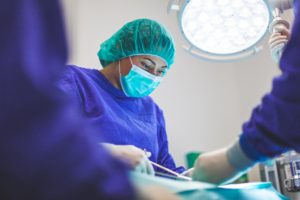Throughout the last few weeks, we have shared valuable information on the topic of diverticulitis. Now, our Orlando gastroenterologist wants to share the way our office diagnoses and treats diverticulitis Continue on for a break down of what your near future may look like.
Let’s go back:
 As we discussed in previous week, diverticulitis is usually diagnosed during an acute attack. This is because the pain people experience during usually encourages a quick trip to a gastroenterologist’s office nearby. Of course, abdominal pain can mean a whole laundry list of possibilities.
As we discussed in previous week, diverticulitis is usually diagnosed during an acute attack. This is because the pain people experience during usually encourages a quick trip to a gastroenterologist’s office nearby. Of course, abdominal pain can mean a whole laundry list of possibilities.
So if you are experiencing abdominal pain, the process to narrow down the possibilities may take a bit of time. First, the doctor will need to rule out causes based off of your symptoms. To begin, your doctor may either begin with a conversation or a physical examination.
During the physical examination, the gastroenterologist may press down on certain areas of your torso, or abdomen, to check for tenderness. Women may require a pelvic examination to rule out pelvic disease. For women that are of childbearing age, a pregnancy test may be next up as pregnancy can be the cause abdominal pain.
 Blood and urine tests are to follow to check for signs of infection. Doctors may also request a liver enzyme test because abdominal pain is a sign of liver-related issues. For anyone who has diarrhea, a stool sample can be very helpful.
Blood and urine tests are to follow to check for signs of infection. Doctors may also request a liver enzyme test because abdominal pain is a sign of liver-related issues. For anyone who has diarrhea, a stool sample can be very helpful.
If after all of those tests your doctor does not have an answer, it may be time for a CT scan. This test can identify inflamed or infected pouches. A CT scan can confirm a case of diverticulitis, also called a diagnosis.
Treatment for uncomplicated diverticulitis:
As any other condition, treatment depends on the severity of the symptoms. When symptoms are mild, they may be treated easily at home. Doctors are likely to recommend antibiotics to treat infection. In very mild cases, antibiotics may not be necessary.
The decision to use antibiotics would be made by the doctor of course. A liquid diet may be recorded to give your bowel time to heal and the ability to heal gently. Once symptoms improve, you may gradually add solid foods you would regularly eat back into your diet.
An over-the-counter pain reliever such as ibuprofen or acetaminophen should be fine to use to deal with pain or discomfort. This treatment plan is best suited for those with uncomplicated diverticulitis.
Treatment for complicated diverticulitis:
For those that have severe pain or other medical issues, hospitalization may be necessary. Intravenous antibiotics could possibly be the best treatment for complicated diverticulitis. The doctor may recommend a procedure which involves inserting a tube to drain and abdominal abscess if one has formed.
In many cases, surgery may be discussed and recommended. Especially if you have complications such as a bowel abscess, fistula, puncture in the bowel wall, or obstruction, you’ll likely need surgery. Also, if you have had multiple episodes of uncomplicated diverticulitis, you may be advised to consider surgery. Lastly, for those with a weakened immune system, surgery may be the best, effective treatment plan.
Types of surgery:
 Now, we should discuss the differences between the two types of surgery used to treat diverticulitis. The first and less invasive option for diverticulitis is called Primary Bowel Resection. This procedure may be an open surgery or a laparoscopic procedure.
Now, we should discuss the differences between the two types of surgery used to treat diverticulitis. The first and less invasive option for diverticulitis is called Primary Bowel Resection. This procedure may be an open surgery or a laparoscopic procedure.
Laparoscopic is minimally invasive. In the Primary Bowel Resection, the surgeon removes the diseased sections of intestine. Once the damaged parts are removed, the surgeon reconnects the healthy segments together. At the end of it all, the procedure allows patients to have normal bowel movements.
The second procedure your doctor may recommend is called Bowel Resection with colostomy. If there is too much damage for the colon and rectum to be rejoined, the surgeon will perform a colostomy. In this situation, the stoma, or opening in the abdominal wall, will be connected to a healthy section of the colon.
Waste passes through the opening into a waste bag. Once the inflammation has reduced or subsided, the colostomy may be reversed and the bowel reconnected. Discuss your options with your Orlando gastroenterologist at Gastroenterology Consultants of Central Florida.
Staff Writer
